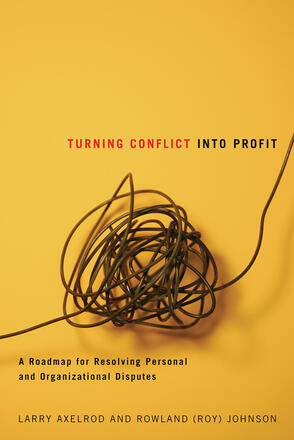
Turning Conflict Into Profit
A Roadmap for Resolving Personal and Organizational Disputes
Description
Conflict in the workplace becomes expensive when an organization’s efficiency is damaged by friction between employees. Conflicts can threaten the profitability and innovation of business, the sustainability of public institutions, and the health and achievement of individuals.
Faced with conflict most people either lean away, avoiding the issue, or charge right in, escalating the problem. Neither strategy is ultimately successful and the social and financial costs can be devastating.
Drawing on principles of psychology and sociology, Larry Axelrod and Roy Johnson have developed a new alternative for workplace conflict resolution. Turning Conflict Into Profit explains how “leaning into conflict” not only defuses workplace tensions but releases blocked energy into positive channels of development. Written in plain language, with real-life examples, Turning Conflict Into Profit offers a practical and rewarding roadmap through conflict.
Reviews
"The authors provide techniques to help readers “lean into” the conflict as opposed to charging or avoiding. Case studies from the health-care, corporate, and community sectors are provided as teaching tools for each step, along with chapter summaries." Louise Karch, Canadian Book Review Annual, 2006
"Turning Conflict describes many instances of workplace conflict, and tries to show, contrary to conventional wisdom, they don't produce tougher, fitter workers: They produce losers, and the biggest loser is often the company...To escape what Axelrod and Johnson (senior executives in The Neutral Zone, a human-resources consultancy) refer to as 'the conflict trap,' takes 'curiosity and courage,' to move through 'the narrow place' and on to 'the profit track.'" John Simpson, The National Post, Nov 2, 2005
"Eradicating conflict isn't the goal, Johnson said. Instead, the aim is to teach employees and their managers how to handle conflicts that inevitably happen in the workplace. When conflicts are handled well, they can lead to better employee health, co-operation and loyalty, which in turn leads to improved efficiency, creativity and profitability, Axelrod and Johnson write in their book." The Edmonton Journal, November 24, 2006